Poblano peppers and banana peppers are incredibly different, but they both bring something special to the table.
Poblano peppers are flat and smooth, reaching 4-6 inches. Banana peppers are only 2-3 inches with a slender, dimpled appearance. Poblanos are relatively mild, coming in at 1,000-2,000 SHU, and are typically blistered to mellow out the flavor and for easy removal of the outer skin. Banana peppers have only a 0-500 SHU rating and are usually pickled.
Read on to learn all about these two delicious peppers!
Comparison – Differences between poblano peppers and banana peppers
Poblano peppers and banana peppers are on two opposite sides of the spectrum.
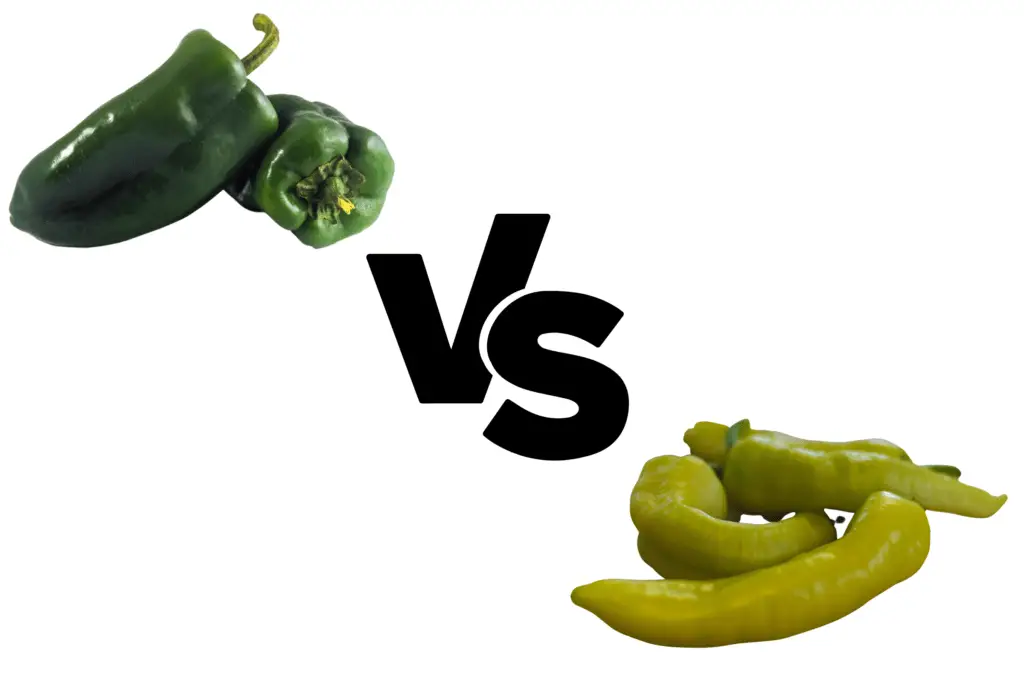
Let’s look at the similarities and differences between poblano and banana peppers based on the following criteria:
- Poblano peppers vs banana peppers heat level
- Poblano peppers vs banana peppers flavor
- Poblano peppers vs banana peppers texture
- Poblano peppers vs banana peppers size and shape
- Poblano peppers vs banana peppers nutrition
- Poblano peppers vs banana peppers cost and availability
- Unique difficulties
- Substitutions
| Criteria | Poblano Pepper | Banana Pepper |
|---|---|---|
| Heat level | 1,000-2,000 SHU | 0-500 SHU |
| Flavor | Deep, dark, smoky | Sweet and tangy |
| Texture | Smooth | Mostly smooth, may have slight wrinkles |
| Size | Up to 6″ | 2-3″ |
| Shape | Relatively flat | Slender and cone-shaped |
| Nutrition (per 100g) | 20 Calories 134% DV Vitamin C | 27 calories 92% DV Vitamin C |
| Substitutions | Green bell pepper | Pepperoncini pepper |
Poblano peppers vs banana peppers heat level (in Scoville heat units)
Poblano peppers range from 1,000-2,000 SHU.
Banana peppers have a range of 0-500 SHU.
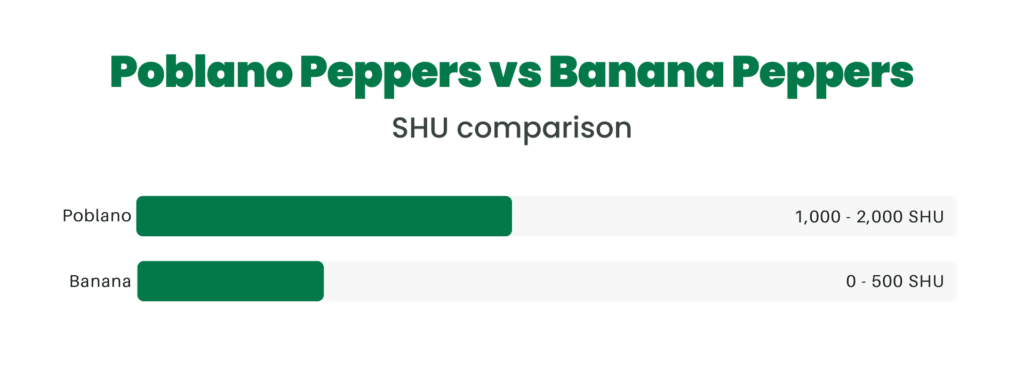
The spiciest banana pepper is only half as spicy as the most mild poblano, and ¼ as spicy as the spiciest poblano.
Poblano peppers vs banana peppers flavor
Poblano peppers have a rich, earthy umami flavor.
Banana peppers are tangy with sweet notes. They’re frequently pickled, adding another dimension of flavor.
Poblano peppers vs banana peppers texture
Poblano peppers have a smooth, tough layer of skin.
Banana peppers are mostly smooth but have slight wrinkles.
Poblano peppers vs banana peppers size and shape
Poblano peppers are a bit flat and come in at 4-6 inches.
Meanwhile, banana peppers are slender and cone-shaped, about 2-3 inches long.
Poblano peppers vs banana peppers nutrition
Poblano peppers and banana peppers – like the majority of peppers – are both low in calories and high in Vitamin C.
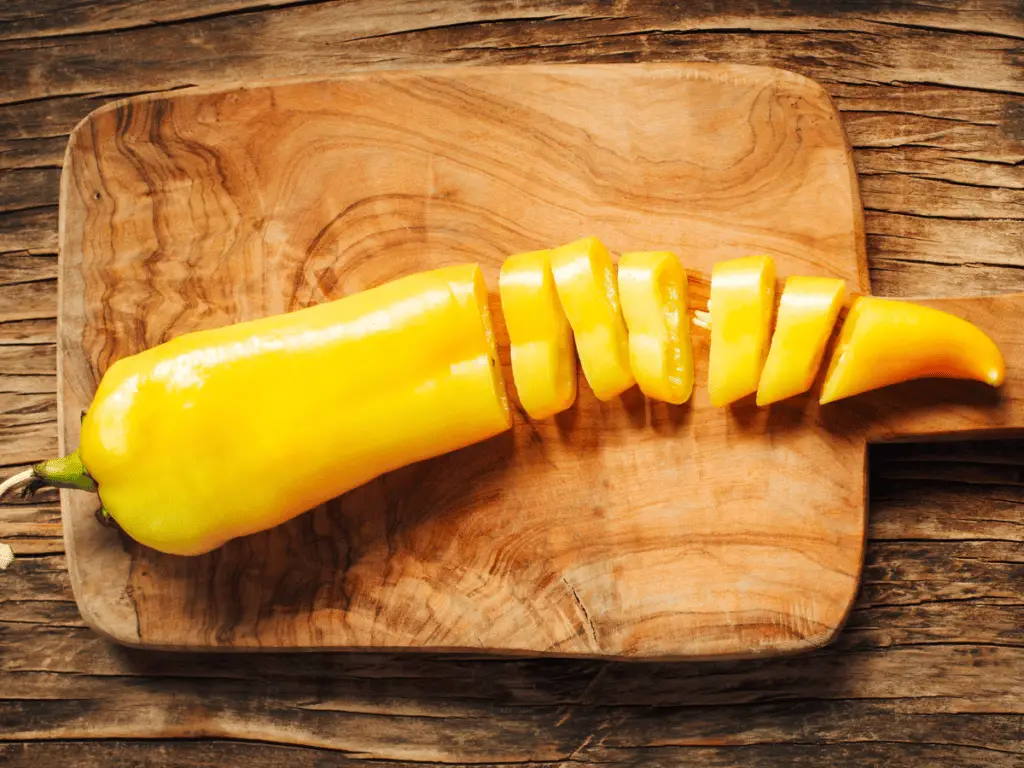
Vitamin C is an essential antioxidant that targets free radicals in our body, hence its anti-cancer effects.
While there isn’t much capsaicin in banana peppers, the capsaicin found in both kinds of peppers is potentially anti-inflammatory.
Poblano peppers vs banana peppers cost and availability
Pickled banana peppers are quite easy to find and don’t cost very much.
Poblano peppers are moderately easy to come across, but you won’t find them stocked in every grocery store.
Raw banana peppers are hard to find and therefore cost a bit extra.
Unique difficulties
The most difficult aspect of cooking with poblanos is probably their tough outer skin.
Meanwhile, the hardest thing about raw banana peppers is finding them!
Can you substitute poblano peppers for banana peppers or vice versa?
You can’t substitute poblano peppers for banana peppers, or vice versa. They have vastly different taste profiles- poblanos are smokey while banana peppers are sweetly tangy.
A better substitute for a poblano pepper is either a green bell pepper or an Anaheim pepper. While the Anaheim pepper doesn’t have the same flavor profile, it does offer a similar level of heat.
A natural substitute for the banana pepper is the pepperoncini, especially if you’re looking for a comparable pickled pepper.
Poblano peppers – a complete overview
Poblano peppers are a mildly spicy pepper often used in Mexican cuisines. They’re often grilled or roasted and are a favorite among gardeners because they’re relatively easy to grow, yield a bountiful harvest, and are just plain delicious.
Let’s talk about the beloved poblano pepper!
Heat
Poblano peppers have an SHU rating that ranges from 1,000-2,000.
“Immature” poblano peppers are dark green, whereas mature poblanos are deep red. Capsaicin levels increase as peppers age, so red poblanos can be up to twice as spicy as green ones!
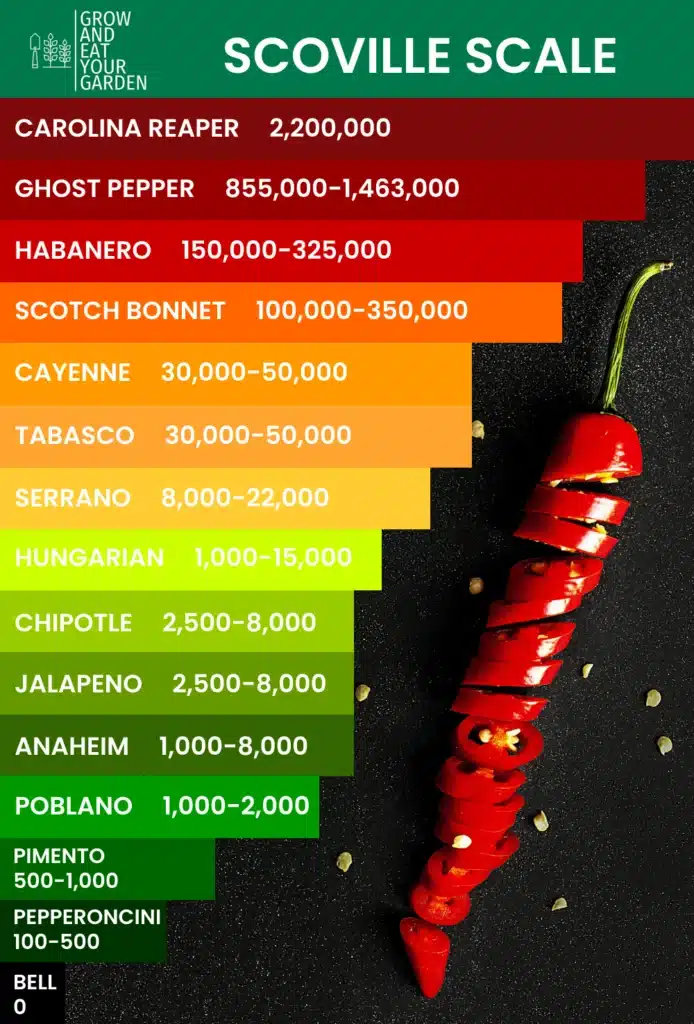
Flavor
Poblanos have a deep, earthy, smokey umami flavor with a mild hint of spice.
While they are not the hottest pepper (by any means), they are one of the most flavorful!
Size, shape, and texture
Poblano peppers range from 4-6 inches long.
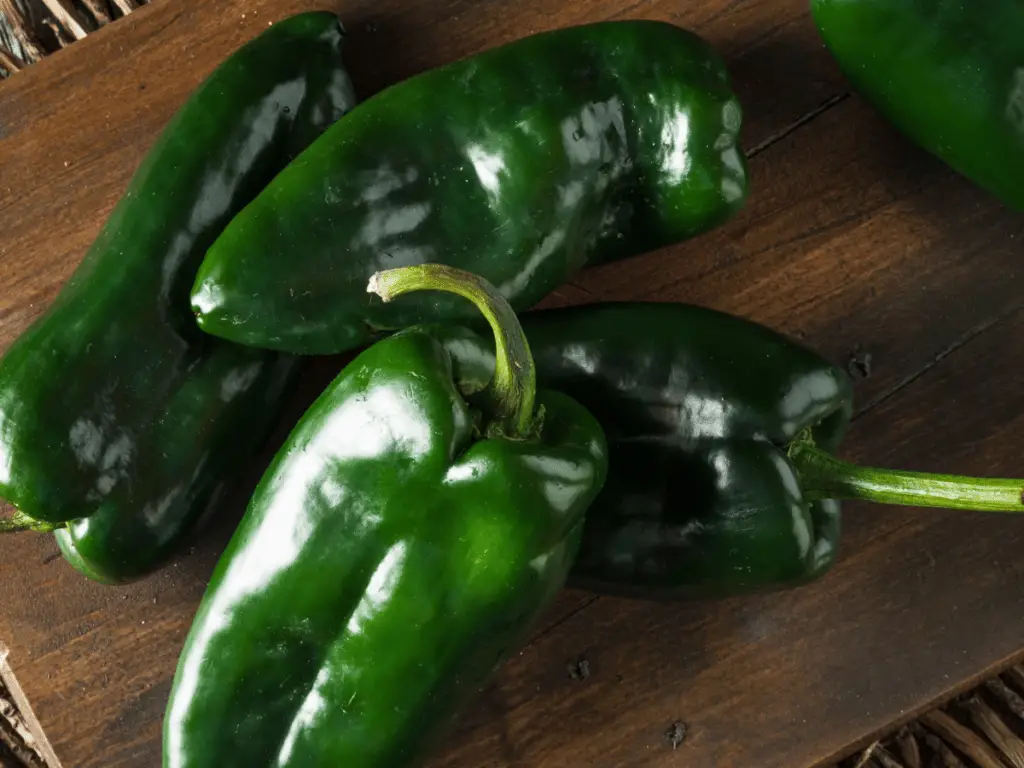
They’re similar to bell peppers in shape but are slightly flatter.
Poblano peppers have a smooth yet tough outer skin.
Nutritional content and potential health benefits
One cup of raw poblano peppers contains:
- 30 calories
- 30% DV Vitamin B6
- 134% DV Vitamin C
- 14% DV dietary fiber
Some potential health benefits of poblanos are:
- High capsaicin and vitamin content
- High antioxidant content
- Fighting free radicals
- Anti-inflammatory properties
Cooking with poblano peppers
Poblano peppers can be quite polarizing – some people adore them raw, while others absolutely can’t stand the tough skin!
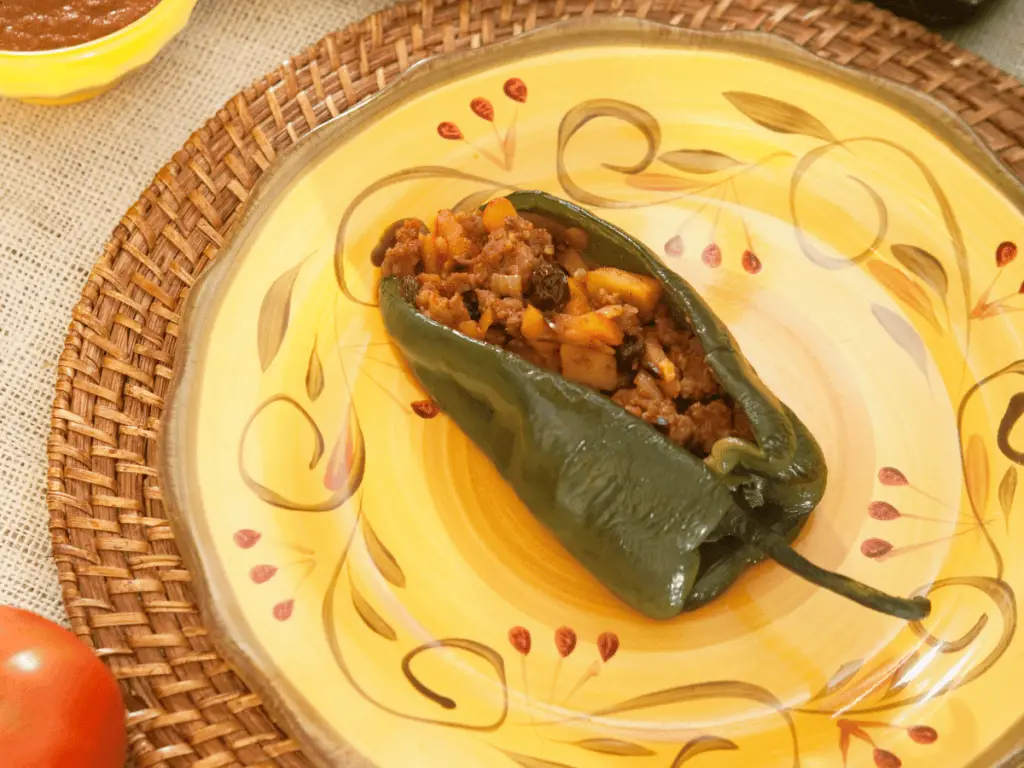
Most people can agree that one of the best ways to cook poblano peppers is to blister them. This draws out the depth of their earthy flavors.
Of course, you can also grill, roast, or saute your poblanos.
Substitutions for poblano peppers
Bell peppers are a common substitute for poblano peppers. Bell peppers aren’t spicy and are sweeter than poblano peppers, but generally speaking the swap works just fine.
Freezing, drying, and preserving poblano peppers
Freezing, drying, and pickling poblano peppers are all popular ways to extend their shelf life.
Banana peppers – a complete overview
Banana peppers are a favorite for topping for salads and sandwiches of all kinds. The slightly sweet, slightly tangy, slightly salty flavor of the pickled pepper adds a little something special to every bite!
Let’s take a look at these versatile little peppers!
Heat
Banana peppers have a rating between 0-500 SHU.
You’ll barely be able to detect any spice at all.
Flavor
Banana peppers are sweet and tangy. Pickling them draws these flavors out even further.
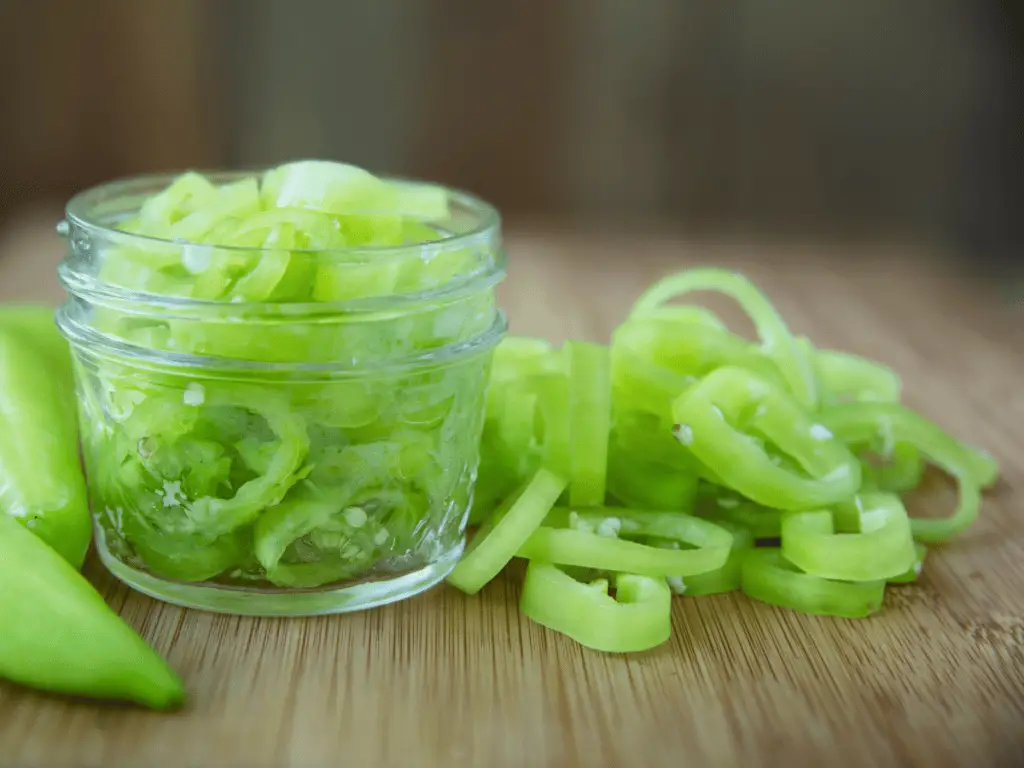
Size, shape, and texture
Banana peppers are 2-3 inches long.
They’re slender, triangular cones.
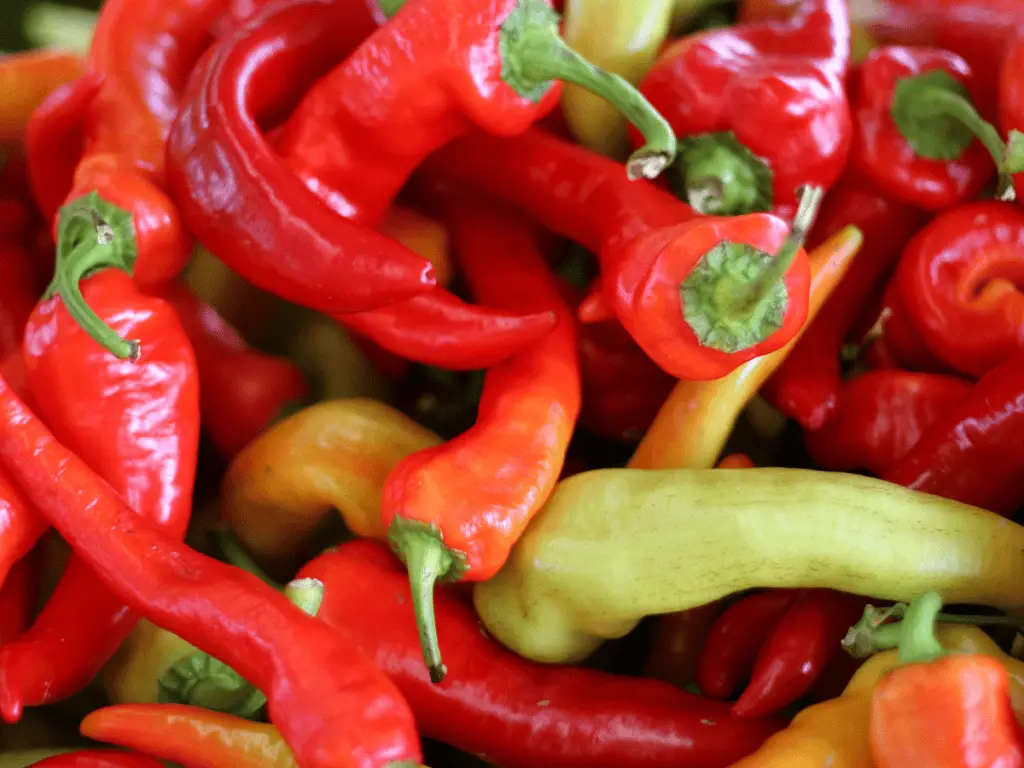
Banana peppers have slight dimples in them.
Nutritional content and potential health benefits
One cup of banana peppers has:
- 32 calories
- 4g protein
- 172% DV Vitamin C
- 16% DV Dietary Fiber
If you use pickled banana peppers, there will also be a high sodium content.
Some potential health benefits include:
- Blood pressure control
- Increased metabolism
- Anti-cancer properties
Cooking with banana peppers
Banana peppers are often found pickled at the store, and can be used as a topping.
You can also fry banana peppers, stuff them, make salsa, or put them on pizza.
Substitutions for banana peppers
Pepperoncinis are a good substitute for banana peppers because they have a similar SHU rating and a comparably tangy flavor.
You can also use bell peppers as a substitute for banana peppers because banana peppers only have the faintest hint of spice.
Freezing, drying, and preserving banana peppers
Just like any other pepper, you can freeze, dry, and pickle banana peppers.
Since you likely buy them pickled at the store, it could be fun to pickle them at home instead!

